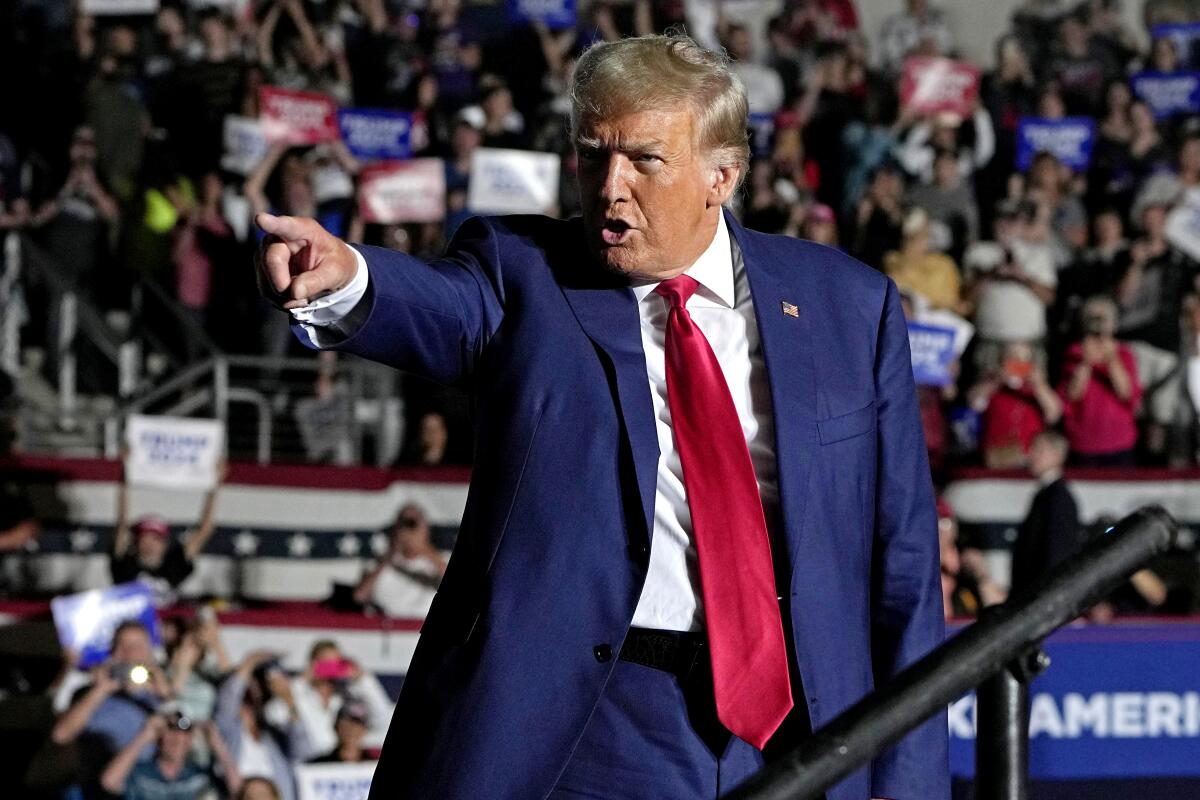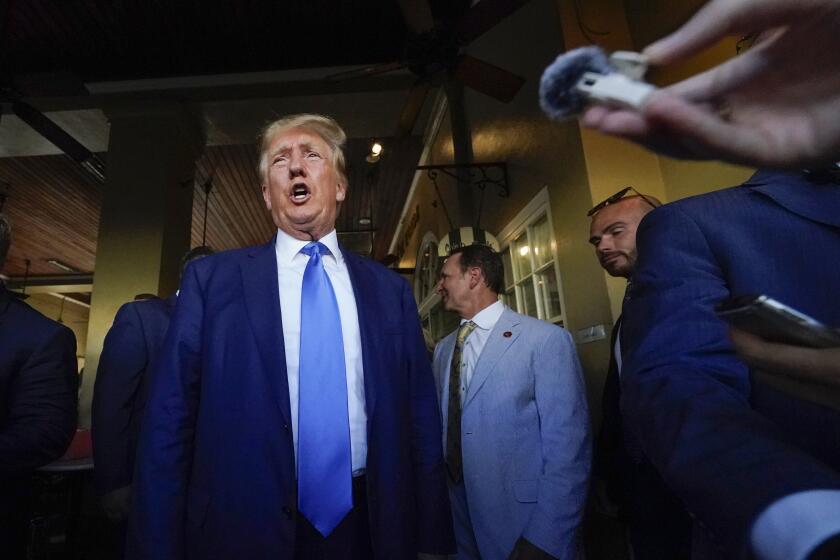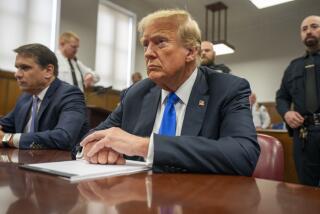Commentary: The way TV news covers Trump’s legal problems could make or break democracy

- Share via
Another week, another Donald Trump arraignment
Never mind that the third and most recent indictment of the former president portends the highest-profile criminal trial in U.S. history, and, should it result in a conviction, a crime that would make Watergate look like a parking ticket. Tuesday’s announcement of four felony counts accusing the former president of scheming to overturn the results of the 2020 election should have stopped the country in its tracks. Traffic frozen atop freeways. Coffee dropped on office desks. Ice cream cones melting in the clenched hands of shocked citizens.
Instead, the bombshell news slipped into the same slow drip of revelations that have turned Trump’s perpetual legal reckonings into the networks’ white noise. No matter how they tried to elevate the importance of this specific development above all the others, Tuesday’s news just didn’t have the seismic impact that it should have.
The cognitive dissonance between the magnitude of the event and the “Oh, it must be Tuesday in Trump’s America” reaction it generated illuminates the challenges a frenetic news media faces in covering our glacially paced legal system.
The indictment alleges that Trump pursued discounting legitimate votes and subverting the 2020 presidential election results through three criminal conspiracies.
The law isn’t an Olympic sprint; it’s a chess match. And we all know which of those things brings in higher ratings. That means the biggest political scandal in generations risks getting flattened into the shape of any other news story.
In the era of 24/7 media, digital and cable outlets rely on a constant stream of breaking news, sexy headlines and attention-grabbing events to pull in ratings and readers and, in turn, pay the bills. Thankfully, the complicated state and federal legal system that’s produced multiple investigations of and cases against Trump could care less about the needs of CNN or The Times, much less TikTok. But that means TV networks powered by years of chaos under the former president must now find creative ways to keep the story going in the days, months or even years before any plea bargains are made or court trials begin.
The irony is that special counsel Jack Smith’s investigation into Trump’s actions around the 2020 election and in the lead-up to the Jan. 6 insurrection has been characterized as “high velocity.” In June, he also indicted Trump, charging him with risking national security by taking classified documents out of the White House. But what’s considered swift in the world of legal probes and grand jury decisions is practically a crawl in the eyes of the media.
Many outlets followed up their initial reporting on Tuesday’s indictment by posting — or, on TV, reading live — excerpts from the 45-page document: “Despite having lost, the defendant was determined to remain in power. So for more than two months following election day on November 3, 2020, the Defendant spread lies that there had been outcome-determinative fraud in the election and that he had actually won. These claims were false, and the defendant knew that they were false,” the indictment said.
With a controversial star, a subject conspiracy theorists love and a sensational box-office take, ‘Sound of Freedom’ couldn’t help but stir up a fight.
The words were chilling, describing a type of criminality and treachery formerly associated with overseas oligarchies and banana republics. Anchors, pundits and legal experts said as much during the continuous coverage on CNN and MSNBC. They could not overstate the gravity of the moment, nor could they predict where it would lead, but they’ll certainly be unpacking that question for a year or more while waiting for movement on any or all of Trump’s legal woes. He was hit with criminal charges in New York stemming from a hush money case and a civil trial over his business practices. And in Georgia, it’s likely he’ll be charged for his efforts to overturn his 2020 election loss in that state.
Unlike their conservative competitors, they cannot rely on juicy conspiracy theories or manufactured narratives from the GOP — like the stolen-election one that started all this trouble in the first place — to make a story pop. As the indictment and Thursday’s scheduled arraignment recede from view, they will need to keep viewers engaged over the long haul — even, for stretches, in the absence of startling new developments.
Thus far, conservative outlets have predictably integrated the latest indictment news into their ongoing narrative of an anti-Trump witch hunt. But even the likes of Fox News will have to figure out how to keep stoking the outrage machine in the lulls between proceedings or further announcements from the special counsel or state agencies. With so much empty space to fill, the right-wing media’s dangerous tendency to concoct alternative narratives and feed conspiracy theories is certain to ramp up, and when every new incident is presented as an affront to Republicans or a mainstream lie, how does a viewer discern between a monumental event in the history of our democracy or just another group grouse with “The Five”?
Adding to the pressure on news organizations, time is of the essence in all of the cases against Trump as we fast approach an election year. After all, he can still run if he’s convicted — yes, you read that correctly — and perhaps even pardon himself if he were to win.
With all of the above looming, cable news, radio and digital media are faced with a story of immense national and international importance that doesn’t suit their present-day rhythms — or, perhaps more disturbingly, their bottom lines. But if they don’t find a way to hold our attention with the grinding gears of the law, the outcome for the free press, and for a free country, could be far worse.
More to Read
The complete guide to home viewing
Get Screen Gab for everything about the TV shows and streaming movies everyone’s talking about.
You may occasionally receive promotional content from the Los Angeles Times.









